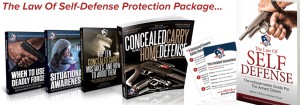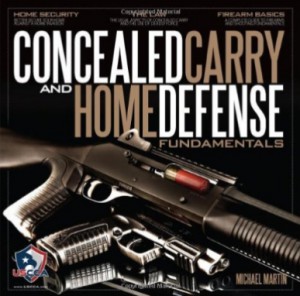In part one of this article, I introduced some of the Florida concealed carry laws. I addressed the places you can legally carry a concealed firearm, the crimes which may be justified to use deadly force when defending yourself, how your conduct will be measured once you do use deadly force, and when can deadly force be used.
For those of us who live the full time RVing lifestyle, having the ability to legally carried a concealed weapon gives us that added level of comfort. However, with that comes great responsibility! If called upon to actually pull the trigger and use deadly force, one has to be aware of the concealed carry laws in Florida as well as its reciprocity states.
In this post, I will talk more about when you can legally use deadly force and when should you stand your ground. These are very important topics when you carry a concealed weapon! So, please take Florida concealed carry laws seriously. When the time comes to pull out your weapon you must be aware of the ramifications and the laws you will have to deal with!
Law of Self Defense
Deadly force may legally be used in Florida:
- When a person has a reasonable belief that deadly force is necessary to prevent imminent death or great bodily harm to themselves.
- When a person unlawfully and forcefully enters or entered a dwelling, residence, or occupied vehicle.
- When a person unlawfully and forcefully removes or attempts to remove you from a dwelling, residence, or occupied vehicle.
- When a person has a reasonable belief that a deadly force is necessary to protect themselves from the imminent commission of a forcible felony.
What would be an example of some of these crimes: murder and manslaughter, kidnapping and sexual battery, robbery and aggravated assault, carjacking and aggravated battery, and home invasion robbery and aggravated stalking.
Law of Defense of Others
Deadly force may legally be used in Florida:
- When a person has a reasonable belief that deadly force is necessary to prevent imminent death or great bodily harm to another.
- When a person unlawfully and forcefully enters or entered a dwelling, residence, or occupied vehicle.
- When a person unlawfully and forcefully removes or attempts to remove another from a dwelling, residence, or occupied vehicle.
- When a person has a reasonable belief that deadly force is necessary to protect another from the imminent commission of a forcible felony.
What would be an example of some of these crimes: murder and manslaughter, kidnapping and sexual battery, robbery and aggravated assault, carjacking and aggravated battery, and home invasion robbery and aggravated stalking.
What about a trespasser on private property?
If you are going to protect your property because a trespasser has entered, don’t shoot! Deadly force is not legally justified! Florida statutes allow for a legal use of force, but not deadly force to terminate a trespass or interference with property.
Now if the trespasser commits or attempts to commit arson, burglary, aircraft piracy or any other forcible felony, then Florida law provides that you are legally justified in using deadly force to defend your property or to terminate a criminal trespass.
The Castle Doctrine
The “Castle Doctrine” is the popular name for a legal philosophy that every person, as the “King” or “Queen” of their home, never has to flee the castle before using deadly force against an intruder. Florida’s version of the Castle Doctrine can be found in Florida Statute #776.013.
Use of Deadly Force Under the Castle Doctrine in Florida
If you know or have reason to believe that an unlawful and forcible entry or act is occurring or had occurred, and you use deadly force when someone unlawfully and forcefully enters or is entering your residence, occupied vehicle or dwelling, or someone unlawfully and forcefully removes or attempts to remove you from those, the Florida concealed carry laws give you legal presumption that fear of imminent death or great bodily harm was reasonable, and deadly force was legally justified without a duty to retreat.
If you have no reasonable escape route Florida concealed carry laws allow you to stand your ground with no duty to retreat and meet force with force!
What are the parameters of this situation?
You have no duty to retreat and have the right to stand your ground if:
- You are not engaged in unlawful activity
- You are in a place where you have a legal right to be
- You have a reasonable belief that deadly force is necessary to prevent death or great bodily harm or to prevent the commission of a forcible felony.
What should you do after the gun goes bang? Invoke your legal rights!
Many countless man and women have sacrificed their lives and fortunes so that we Americans may have legal rights. Don’t waive those rights! If you are involved in a shooting, you may need every legal right available.
What Should You Do After Bang?
- Make sure the threat has been controlled
- Call 911! Just give your name, location and the nature of the emergency. Do not discuss what happened as the call is recorded and it can be used against you in a court of law.
- Return the firearm to safe keeping!
- Call Your Lawyer! Don’t miss this step! Be prepared!!
- When the police arrive, comply with all commands in a non-threatening manner, keeping your hands clearly visible. The police do not know who the good guys and the bad guys are when they first arrive.
- Inform the police that you have been a victim of a crime. State to the police: “I wish to invoke my right to remain silent, and I want to consult my attorney before making any statements.” Your freedom, liberty and fortune are at risk, so invoke your right to remain silent and your right to a lawyer.
- Make no statement to anyone about the incident; wait to talk to your attorney!
- If asked to accompany law enforcement, comply, but make no statements.
- Do not make jokes or cute remarks and say nothing, even if you believe you have done nothing wrong.
Summary
If you know the Florida concealed carry laws and you abide by them, you will be ready to decide whether or not to use deadly force!
Thanks to the folks over at US Law Shield for their assistance in compiling the information that I have shared with you!













Recent Comments